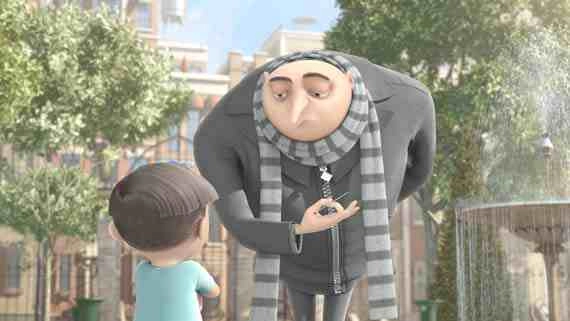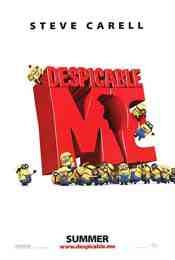Movies
Movie Review: Despicable Me
Despicable Me
Directed by Pierre Coffin and Chris Renaud
Screenplay by Ken Daurio
Story by Sergio Pablos
Steve Carell as Gru (voice)
Jason Segel as Vector (voice)
Russell Brand as Dr. Nefario (voice)
Julie Andrews as Gru’s Mom (voice)
Will Arnett as Mr. Perkins (voice)
Kristen Wiig as Miss Hattie (voice)

Gru (voiced by Steve Carell) in Universal Pictures’ Despicable Me
An Endearing Supervillain
One gets the distinct impression that Despicable Me – like its downtrodden supervillain protagonist – is in dire, dire need of a hug. The title is a dead giveaway, reading much like an attention-starved “FML” update on Twitter, and the film itself celebrates a kind of embittered worldview that is only ever-so-slightly offset by the fact that, as a family film, we know it must end happily. Despicable Me is a wonderful piece of entertainment: witty, spry and capable of eliciting its fair share of “Aw shucks” whimpers of warm-heartedness… but it also seems to wallow in its underdog status, as indeed any CG-animated movie that wasn’t developed by a company that rhymes with “Shmixar” must.
Steve Carell and a small army of animators star as “Gru,” a middle-aged supervillain with hundreds of loyal minions who look like an artificial intelligence experiment went awry at a Twinkie factory. When a mysterious new supervillain captivates the world with his flamboyant heist of an Egyptian pyramid, Gru is forced to take stock of his own, relatively meager accomplishments. Whereas Gru was once content to steal the Times Square Jumbo-Tron, this eager young upstart has raised the bar considerably. As we see in a regular series of flashbacks, Gru’s entire life has been spent in a desperate plea for attention, hoping that someone… preferably everyone… will look upon his works and despair. Or at least contribute some polite and vaguely fearful applause
Gru needs to step up his game in order to regain the somewhat-paltry respect he had earned as a supervillain, and so begins his ambitious plot to steal the moon. Since the moon is a little on the big side, Gru must first steal a prototype shrinking ray, which is then stolen by the same villain who stole Gru’s thunder at the beginning of the story, and so begins a second ambitious plot to steal the shrinking ray back from “Vector” (played by Jason Segel). Vector’s compound is impenetrable, so Gru must resort to drastic measures by adopting three adorable young orphans (Miranda Cosgrove, Dana Gaier, Elsie Fisher) who sell the Girl Scout cookies to which Vector is hopelessly addicted, and who will allow Gru to infiltrate his competitor’s compound with his malevolent robot cookies.
If the set-up seems contrived to you, then you must be a very, very observant person. Indeed, it takes quite a long time for Despicable Me to get to the heartwarming “point” of the film, so it’s important to take a moment now to compliment the accomplished direction of Pierre Coffin & Chris Renaud, who keep things moving at such a brisk pace that many such reasonable criticisms seem beside the point. Moreover, Coffin & Renaud deserve credit for taking an impossibly expensive production mass-marketed to all audiences by a major media outlet in order make gigantic wads of cash and somehow make it feel like a genuine piece of artistic expression anyway. Though the clichéd tale of an old curmudgeon who learns to love again through the aid of an adorable ragamuffin (or in this case “muffins”) is about as trite as it comes, the aforementioned Eeyore-esque tendency for wallowing in misery keeps Despicable Me from ever turning into actual tripe. The groovy tunes from Heitor Pereira and his collaborator Pharrell lend an air of personality that most other mainstream forms of entertainment never seem to be able to inhale, let alone convert into a life-giving force.
Where Despicable Me falters, if only a little, is in the details of its fictional universe, which is populated by more supervillains than superheroes, in that there are many of the former and none whatsoever of the latter. Perhaps this is why Gru feels no need whatsoever to hide his shenanigans from the authorities: His home looks like the Bates Motel was renovated by Lex Luthor, and he has no qualms whatsoever using his freeze ray to cut in line at Starbucks. Or perhaps this is just more of that trademark Despicable Me cynicism: the real world certainly seems full of Lex Luthors and thoroughly lacking so much as a Forbush Man. Gru bankrolls his wild schemes with the aid of the Bank of Evil, “Formerly Lehman Brothers.” Ha ha. Point made. Evil is everywhere.
But as mentioned above, Despicable Me’s villains aren’t exactly Captain Nazi. Gru isn’t so much a hatemonger as he is bitter, a fact illustrated early on as we discover he knows all of his identical minions by name, and even pays them a decent wage. Gru’s journey isn’t from evildoing to doing good, but rather one of adjusting expectations. Over the course of the film, caring for three young girls with complexes of their own (getting thrown in a box at your orphanage will do that) doesn’t so much make Gru see the error of his ways, put on a cape and save the world as it does give him the ability to determine his own worth, if only because he learns to see value in others. It’s not much of a twist on the “Indifference to Concern” genre, but it does make Despicable Me a little less insufferably saccharine than it would appear at a glance. Even the inevitable asides with Gru’s walking Happy Meal Toy henchmen manage not to muck up the movie’s sense of tone: They’re not so much comic relief as they are actually kind of funny, and hardly ever feel like a distraction from the film’s more morose subtexts.
Despicable Me comes out at the height of the summer season in an effort to grab our attention, but also has enough personality to stand on its own even if popularity somehow eludes it. The very existence of this film is thematically appropriate, but don’t let deeper meaning dissuade you from enjoying this charming and thoroughly entertaining piece of family entertainment that will keep the kids enthralled without pandering to the adults being dragged into the audience. Even the 3-D isn’t too bad, except for a rollercoaster sequence that seems designed to push even the most ardent 3-D fan’s level of tolerance. (Besides, the effect is imperceptible after about 15 minutes, and therefore never worth the higher ticket price.) Like Gru, Despicable Me is just a little too hard on itself. Big hugs all around.
Despicable Me Trailer
William Bibbiani is a highly opinionated film, TV and videogame critic living in Los Angeles, California. In addition to his work at the “California Literary Review” William also contributes articles and criticism to “Geekscape” and “Ranker” and has won multiple awards for co-hosting the weekly Geekscape podcast and for his series of Safe-For-Work satirical pornographic film critiques, “Geekscape After Dark.” He also writes screenplays and, when coerced with sweet, sweet nothings, occasionally acts in such internet series as “Bus Pirates” and “Heads Up with Nar Williams.” A graduate of the UCLA School of Film, Television and Digital Media, William sometimes regrets not pursuing a career in what he refers to as “lawyering” so that he could afford luxuries like food and shoes.
William can be found on both the Xbox Live and Playstation Network as GuyGardner2814, and on Twitter as – surprisingly – WilliamBibbiani.






You must be logged in to post a comment Login